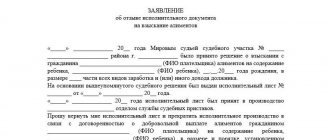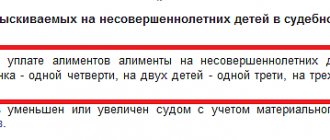Is alimony paid, collected, or taken from the pension?
The Family Code of the Russian Federation states that parents pay child support from wages or other income. The types of other income are determined by a separate legal act - Government Decree No. 841, which establishes a list of types of income from which alimony in favor of minor children can be withheld.
In accordance with the specified document, the pension refers to the income from which alimony is withheld.
Pension legislation implies several types of pensions:
- By old age;
- For disability;
- Military pension;
- Military veteran's pension;
- Pension of an employee of the Ministry of Internal Affairs.
Reference: According to Resolution No. 841, only the survivor's pension is not taken into account as a source of income. Thus, persons receiving a pension are required to pay child support from any pension, regardless of its type.
To calculate alimony, monthly increases, allowances and additional payments to the pension are also taken into account, that is, the allowance is calculated from the total amount of funds received by the pensioner - the alimony payer.
By disability
By law, the parent who does not live with the child is required to transfer funds for child support, especially if a court decision has been made against him. Disability is not a reason why a parent should not pay child support.
Please note that child support will be deducted from the parent's entire income. For a disabled person, this may be not only his disability pension, but also:
- wages (if the person works);
- scholarship;
- unemployment benefit;
- business income;
- income from civil contracts (including from the rental of property);
- amounts of financial assistance;
- other types of income specified in Resolution No. 841.
Therefore, if a disabled person lives not only from pension funds, his total income is taken into account. If a disability pension is the only source of livelihood, then only these funds will be taken to calculate the amount of alimony payments.
Important: A disability pension is assigned to disabled people of groups 1, 2, 3, regardless of the cause of disability.
If the disability occurs after the alimony award has been made, the person may file a claim to reduce the amount of the payments. As confirmation, it will be necessary to submit relevant certificates from medical institutions and conclusions of medical commissions.
Serviceman
To calculate the amount of payments for minor children, in addition to the serviceman’s other income, the pension is also taken into account. By law, military personnel retire earlier than other citizens. This is due to the fact that military people have the opportunity to retire early - before reaching the general retirement age.
You can become a military pensioner if you have preferential service. This includes:
- period of hostilities;
- participation in emergency response;
- period of work with nuclear weapons;
- pilot work;
- service in the highlands.
The duration of military service must be at least 20 years. In this case, the person can retire based on length of service. It turns out that someone can become a pensioner after 30 years, and someone at 50 years old - it all depends on how quickly the person earns preferential seniority and from what time he has been doing military service.
However, retirement is not grounds for exemption from paying alimony. Laws in the Russian Federation apply equally to all citizens. Military personnel are no exception. These persons pay alimony in the general manner; they do not have special privileges. Military personnel are required to contribute monthly funds for the maintenance of minor children.
Pensioner of the Ministry of Internal Affairs
Employees of the Ministry of Internal Affairs have the right to retire based on length of service. To receive a pension, you need to have a certain length of service - this is 20 years of service in the Ministry of Internal Affairs. After retirement, a citizen can continue to work in law enforcement agencies, receiving a salary. In this case, alimony will be calculated from the amount of earnings and pension.
If a citizen stops working, the pension will be considered as the main income when calculating alimony. There are no significant differences in the collection of alimony from a pensioner of the Ministry of Internal Affairs in comparison with, say, a military pensioner.
By old age
Citizens who work officially and deduct taxes from their salaries have the right to a labor pension (old-age pension) upon reaching retirement age. In Russia it is 55 years for women and 60 years for men. A person must pay taxes to the state budget for at least fifteen years in order to qualify for a pension in the future. However, even if the length of service is insufficient, the citizen will be assigned a social pension.
As a rule, people older than this age continue to work in rare cases. Accordingly, the old-age pension is their main source of livelihood. However, alimony payments will be withheld, regardless of the fact that the person is already retired.
Procedure for issuing alimony
At the request of the parent in whose favor the deduction was made, alimony amounts can be received either at the cash desk of the relevant institution where the military serviceman who is obligated to make alimony payments works, or transferred to a bank account, or sent by the accounting department by postal order. However, it must be taken into account that many military units operate in closed areas, so receiving withheld alimony payments from the company’s cash desk is not always possible.
To determine the procedure for receiving alimony payments, the parent-collector must submit to the accounting department of the military unit (or other institution where the military serviceman paying the alimony works) a corresponding application about where he will receive withheld alimony in the future. This application indicates the bank details or postal address of the alimony claimant.
All financial costs associated with bank or postal transfer of alimony payments are also deducted from the income of the military personnel paying alimony.
There are cases when the address of the recipient of alimony payments is unknown to the accounting department and the payer himself. In this situation, the employing institution must still withhold alimony, notify the bailiff about the current situation and transfer the withheld amounts to the deposit account of the court located at the location of the employing institution.
Termination of alimony obligations for military personnel
If alimony payments are made by agreement of the child’s parents, the serviceman is exempt from further alimony payments if:
- one of the parties has died (either the serviceman himself or the child in whose favor payments were made);
- the alimony agreement concluded by the parents has expired;
- there are grounds for termination of payments that are expressly provided for in the agreement itself (for example, a condition is stipulated that payments will stop when the child graduates from college).
Payments of alimony payments collected from a military serviceman in court must stop in the event of:
- the child of a military serviceman reaches the age of majority;
- children of a military serviceman acquire full legal capacity until adulthood;
- adoption of a child of a military man, for whose maintenance alimony payments were withheld, by another person;
- recognition by the courts of restoration of working capacity or lack of need for assistance from the citizen receiving alimony;
- the entry of a disabled ex-spouse who is the recipient of alimony payments into a new marriage;
- death of the recipient of alimony payments, or the death of a military serviceman obligated to pay alimony.
This is interesting: Is studying at a technical school, vocational school, or institute included in the work experience for a pension?
Amount of alimony
The amount of child support payments can be set either by the parents themselves or by a court decision. Accordingly, in each individual case, payments can be a completely different amount, which is withdrawn from all income or is firmly fixed. The amounts of alimony are clearly presented in the table below.
| By agreement of parents | By the tribunal's decision | |
| Procedure for assigning alimony | The payer and the recipient of payments enter into an agreement on the payment of alimony. Any amount of payments can be specified, but not less than what is required by law, depending on the number of children. | The court determines the amount of payments as a percentage of the parent’s income or as a fixed sum of money if there is no permanent source of income. |
| Minimum amount | At least 25% for one child, 33% for two and 50% for three children. | At least 25% for one child, 33% for two and 50% for three children. |
| Maximum amount | Any determined by agreement, but not lower than the minimum. | No more than 70% of all income can be withheld by bailiffs. |
| Change of size | It is possible to increase/decrease the amount by amending the alimony agreement. | It is possible by filing another claim if new circumstances arise that require an increase/decrease in the amount. |
To understand how the amount of alimony payments is calculated, we will give several examples.
Citizen N., being a pensioner of the Ministry of Internal Affairs and an employee, entered into an agreement with his wife on the payment of alimony. According to the terms of the agreement, he had to transfer 20% of his salary every month to their common child. Citizen N. never made a single payment. The wife appealed to the court with a demand to cancel the agreement and collect alimony in the amount of ¼ per child. The court declared the agreement of the spouses invalid, since the amount of alimony for the maintenance of one child cannot be less than 25% of the parent’s income (Article 81 of the RF IC).
Citizen K. was ordered by a court to pay alimony in the amount of 30% of his salary. After a while, citizen K. acquired a disability and filed a claim to reduce the amount of payments due to loss of work and the onset of disability. As evidence, the MSEC conclusion was provided on the establishment of disability group 3. The court decided to deny the applicant his demands, justifying this by the fact that citizen K., instead of wages, acquired another source of income - a disability pension, and accordingly can pay alimony in the same amount.
Collection procedure
There are 2 options : when the mother and child collect alimony from pension payments, and when the father independently submits documents for payment.
In the first case, the woman needs to submit a written court decision or agreement on the payment of alimony either to the pension fund or to the bailiffs.
It is important to know! Thirteenth (13th) pension
This is what this document looks like. First, it is better to go to the pension fund, because this structure will resolve the issue quickly. After receiving and checking the documents (you will have to wait about a month), the pension fund will make a decision, and if it is positive, alimony from the pension will be collected even before the money is transferred to the father. Actually, the option in which the father submits documents on his own looks the same: you need to submit documents to the pension fund, and the money will be transferred to the mother’s current account automatically.
You need to contact the bailiffs in one of two cases: if there is a debt; if the court ordered payment of a fixed amount.
The first case occurs when the father hid the existence of his pension, and eventually it became known. His income was recalculated and he was ordered to pay everything he owed. Since in case of debt the court acts quite harshly (70% of the debtor’s income per month is taken away for repayment), some men hide their income or refuse to pay. In this case, the bailiffs take over the case: the father will face arrests of accounts and property, a ban on traveling abroad and other troubles.
The assignment of a fixed amount of alimony is also associated with deception. For example, according to documents, a 50-year-old serviceman receives: 10,000 rubles for length of service, 20,000 rubles for salary for an office job. Payment to a minor child – 7,500 rubles. But the mother knows that the ex-husband receives half of his salary “in an envelope”; his real income is 50,000 rubles. Consequently, he does not pay an additional 5,000 rubles. If she manages to prove the presence of unaccounted income in court, the man will be required to pay 12,500 rubles a month, fixed. And the bailiffs will monitor this.
Note : when the case is transferred to the bailiffs, the process of collecting debts/fixed amounts usually lasts for 2-3 months.
Is a pension a basis for reducing the amount of alimony?
Often in court, alimony payers put forward the argument that they cannot pay alimony because they receive a pension.
Alas, all of these are just attempts to avoid obligations to support a child - after all, current legislation does not provide for an exemption from paying alimony for pensioners or even a possible reduction in its amount below that established by law.
Therefore, a pensioner alimony payer is just as obliged to provide for his minor children as a working or even unemployed citizen.
How to collect alimony from a pensioner
The procedure for collecting child support from a pensioner is no different from the standard procedure for collecting funds from any other parent. In particular, extrajudicial and judicial procedures are provided.
Procedure
An out-of-court procedure involves concluding an agreement on the payment of alimony between the child’s parents. This procedure for paying child support is good because the parties can determine for themselves how much the parent will pay. In addition, you can stipulate terms and payment periods. For example, you can transfer funds every month, every two months or quarterly. If the parent’s income allows, then the amount of payments may not be limited (the law does not prohibit transferring large amounts).
The agreement is completed by a notary and, if not fulfilled, may be presented to the bailiffs instead of a writ of execution.
The court procedure is relevant if the parent does not voluntarily provide financial support to the child.
The parent with whom the child lives can sue and forcefully recover funds:
- As a percentage of all income;
- In a fixed amount of money.
Most often, the courts make positive decisions in favor of the plaintiffs. The defendant will be required to contribute funds whether he wants to or not. Control over the execution of a court decision on the collection of alimony is carried out by the bailiff service. A monthly amount determined by the court will be withheld from the person’s income.
In addition, if a pensioner evades payment of alimony, a number of penalties are applied to him:
- A penalty for alimony is assessed;
- He may be held liable for malicious evasion and non-payment.
Statement
If you cannot reach an agreement with the defaulting parent, you can force him to pay funds for the child by filing a claim in court. The applicant can apply either to the court at the place of residence of the defendant or to the court at his place of residence - at his choice.
The claim is sent in two copies: one for the court, the second for the defendant. The statement describes in detail the circumstances of the case:
- Name of the court and address of the court;
- Name of the parties to the case, their full names, residence and registration addresses;
- Circumstances of the dispute: number of children, when the children were born;
- An indication of the moment from which the parent stopped helping financially;
- Justification for the amount of alimony;
- Request to the court to collect alimony;
- Date, list of attached documents and personal signature of the plaintiff.
Each circumstance must be documented.
IMPORTANT: Alimony can also be collected from a pensioner under a simplified procedure, but only if the pension is his only source of income. If there is a question about confirming other cash receipts or about establishing alimony in a fixed amount, then a statement of claim will need to be filed.
You can file a claim either independently, by appearing in court or sending it by mail, or you can entrust the handling of the case for collecting alimony to your representative.
Within 5 days, the judge will decide whether to accept the claim or notify about the presence of deficiencies and offer to eliminate them within the time limit set by him.
Note: Since 2021, it is possible to electronically file claims in courts of general jurisdiction (except for magistrates), however, this will require an electronic digital signature and registration on the State Services portal. Lawyers note that there is still a high percentage of so-called technical refusals in relation to documents submitted through the Unified Automated Identification and Authorization to the courts.
The sample below can be used to file a claim yourself, but it is better to consult with a lawyer first.
Documentation
The statement of claim must be accompanied by documents confirming the claims made in the claim. It can be:
- A copy of the statement of claim to the defendant;
- Marriage certificate;
- Children's birth certificate;
- Certificate from the place of residence of the children;
- Certificates of income of the parent who is raising the children.
All documents, except certificates, are submitted in copies. The originals must be brought with you to the court hearing in case the information contained in them is clarified.
In addition, you must attach a copy of the plaintiff’s passport, and if he is represented by a proxy, a copy of his passport and the original power of attorney. For more information on the composition of documents for collecting alimony, see here.
How to apply for alimony for a pensioner?
What will you need?
- A court decision or agreement to pay alimony.
- If there is data on unaccounted income, documents confirming it.
Step by Step Actions
- Collect documents.
- Open a current account to which money will be received.
- Contact the court (at the pensioner’s place of residence), the pension fund or the bailiffs.
- Wait for a decision (for the court or the fund).
- If there are no problems, wait for the money. If the pensioner refuses to pay, the court does not satisfy the requirements, or the pension fund has not resolved the issue within 3 months, it goes back to court.
It is important to know! What to do in retirement
Expenses
The legislator exempted the plaintiff parent from paying the fee for filing a claim for alimony.
The 150 rubles due for payment will be collected from the defendant if the situation is successful and the decision is positive.
Costs when filing a claim for alimony can only arise when paying for a lawyer's services if the plaintiff is unable to draw up a statement on his own or represent his interests in the lawsuit.
In addition, if alimony is sought as part of a divorce action, the plaintiff will also incur the cost of paying divorce fees.









